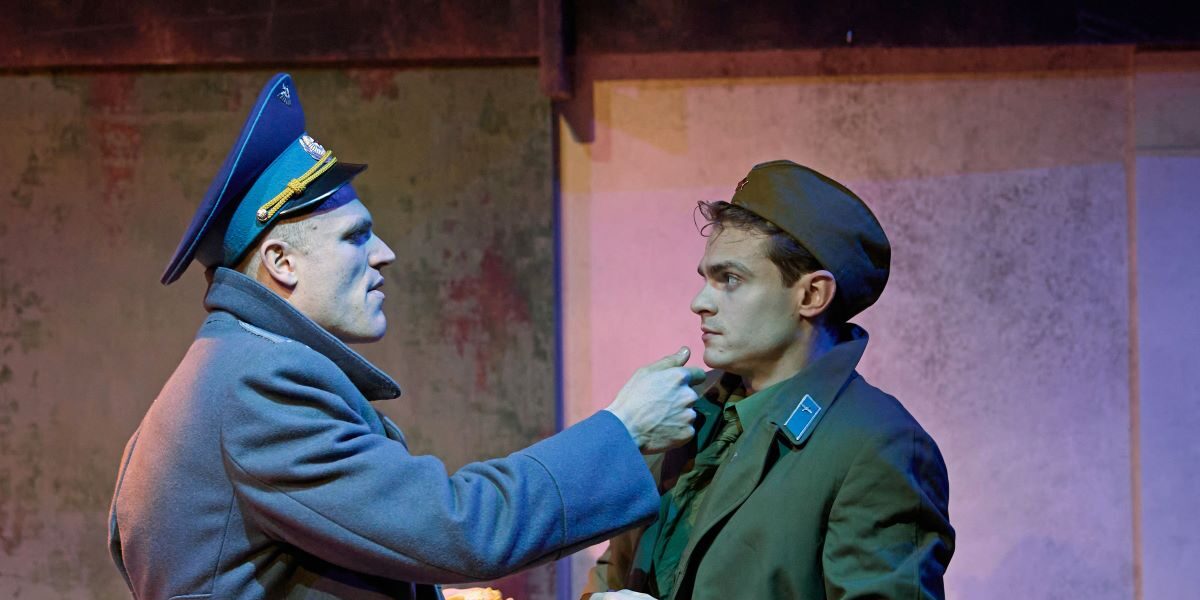‘Firebird’ takes its inspiration, somewhat loosely, from the memoir of actor Sergei Fetisov, and is set in the Soviet Union and Baltic states in the 1970s. The focus is on illicit gay love in the military, where Sergei, a young private doing his National Service, meets a crack professional fighter pilot, Roman, an older officer. We follow the twists and turns in their relationship against the backcloth of the repression of gay relationships in that era, and their own conflictedness. The play also comments on the impact of their lives on two other characters, Alexei, the commanding officer at the air base, and Luisa, his secretary, who is close friends with the two younger men.
The story has great dramatic potential for deep and moving characterisation. Sadly, it is also still highly relevant as social and political commentary, whether on contemporary Russia or globally. However, for a variety of reasons, and despite some individual strong scenes, it does not quite come off.
The main problem lies with the writing, which is much closer to a film script than a play. Indeed, a film was made of this story in 2021 by Peeter Rebane and Tom Prior who are credited in the programme. At ninety minutes the running time is quite short for the volume of story involved, and so what we receive is a succession of mostly short scenes, which compress story lines and restrict detailed character development. As a result, despite the efforts of the actors, and many witty lines, we don’t get to believe in or care about the core connections. In particular, the emerging attraction between Roman and Sergei is too fragmented and patchy for any credible chemistry to emerge. The earliest scenes do well in setting the tone for the privations, restrictions and hypocrisies of the Soviet system, but do not give us sufficiently plausible dimensions for the people.
The two lead actors do their best within these constraints. Robert Eades, as Roman, captures the carefree bravado and debonair charm of the pilot, but is less convincing in conveying the clash between military duty and personal fulfilment; between the need to conform and to follow his sexual nature. Likewise, Theo Walker finds the vulnerabilty and artistic sensitivity of Sergei readily, while not receiving enough scope in the writing to express the maturity, sustained anguish and grief required in the final scenes. Like the image and musical embodiment of ‘The Firebird’, the relationship is never quite integrated or thoroughly worked through.
In some ways the subordinate characters are better served by the text, and certainly the two actors concerned, Sorcha Kennedy and Nigel Hastings, make the most of their opportunities. Kennedy’s role is in many ways more dramatically interesting than the rest, for as a woman in the military and as a brilliant student denied a medical career, she is doubly oppressed by the system, a position that is only further entrenched as she becomes a wife and mother. Kennedy traces emotional warmth and empathy souring into bitterness and resentment with fine skill, so that she comes to dominate the last half hour.
As the ‘Comrade Colonel’, Nigel Hastings carries on the sequence of avuncular world-weary roles he played with distinction in The Forsyte Saga. Both a prisoner of the system and operating cynically within it, he advises, encourages and warns from the sidelines, with particular good results in his scenes with Kennedy. Just as with her role, you feel that the complexities and contradictions of his past could very well be opened out further with interesting results.
The two-door set is flexible and appropriately drab for the era, and the lighting design by Clancy Finn alternates effectively between chilly, unforgiving barracks-brightness, and warmer restaurant and domestic vibes. The rapid succession of scenes means that you begin, after a while, to notice the scene-changing by the actors, as a distraction to the flow of the action; and unfortunately some of the sightlines of the seating layout left those of us sitting in the angles of the three-sided platform somewhat impeded.
You are left wondering what this play might have been had the film not come first……
King’s Head Theatre
Writer: Richard Hough, based on the memoir of Sergei Fetisov
Director: Owen Lewis
Cast: Robert Eades, Nigel Hastings, Sorcha Kennedy, Theo Walker
Until 9 February 2025
90 mins, no interval
Photo Credit: Geraint Lewis

